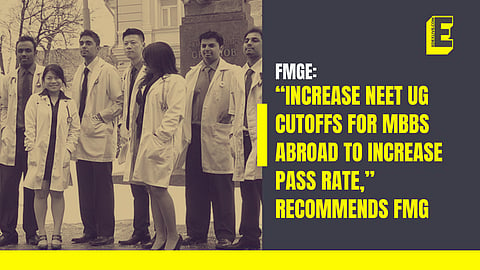

The Foreign Medical Graduate Exam (FMGE) is considered to be notoriously tough to clear — with the net pass percentage of the exam stuck at 10-20 per cent over the years.
In the previous session of the FMGE, which took place in December 2023, around 30,046 candidates out of the 38,355 candidates who took the test failed to clear it, and the pass percentage remained at 22 per cent.
The FMGE is a licencing exam conducted by the National Board of Examinations for Medical Sciences (NBEMS) for Indian students who pursued their medical education and graduated from foreign universities. Foreign Medical Graduates (FMGs) who clear this exam become eligible to practice medicine in India.
Experts have attributed several reasons to the low pass rate of the exam, such as a lack of clinical exposure for FMGs and the absence of a common benchmark for FMGs graduating from across the world.
Thus, the question arises – How to fix this?
Dr Deepak Aanjna, an FMG who is currently working as a Medical Officer at the United Public Health Centre in Ratlam, Madhya Pradesh and a YouTuber with 18k subscribers, proposes one solution – increase the cutoff marks of the National Eligibility-cum-Entrance Test for Undergraduate (NEET-UG) admissions for students who want to pursue medicine abroad.
Taking to X, he writes, “I strongly recommend that the government should set a minimum cutoff of 300 or 305 for medical students who want to study MBBS abroad. Many students struggle for years to pass the FMGE exam, with only 10-20 per cent success rates (.sic)”
He says, “As the NEET cutoff for being eligible to study abroad is very low, you often find students, who may or may not be serious about studying medicine choosing to go abroad, as they won’t be able to get admitted in India,” while speaking to EdexLive. “It is also important to understand that not everyone has the aptitude or fitment to become a doctor,” he adds.
Moreover, FMGs have no option other than the FMGE to be able to practice in India, and not clearing it would render their five years of education a waste, he says.
“Not only does the student suffer, but so does their entire middle-class family. Relatives and neighbours regularly mock them, asking them what their child is doing. The emotional and financial toll is huge,” he explains.
It is also due to these cutoffs in NEET UG that FMGs are seen as “inferior”, and discriminated against by their Indian counterparts.
“The FMGE and NEET exams have the same difficulty levels, but Indian medical graduates (IMGs) overlook the FMGE. This is also why FMGs are made to wait for months together before hospitals take them in for their Compulsory Rotating Medical Internships (CRMI),” he says.
“I believe that by increasing cut-off marks for foreign medical education in the NEET UG, we can increase the standards of FMGs and these problems could be at least partly solved,” he maintains.
The first session of the FMGE is scheduled to be held on July 6.
